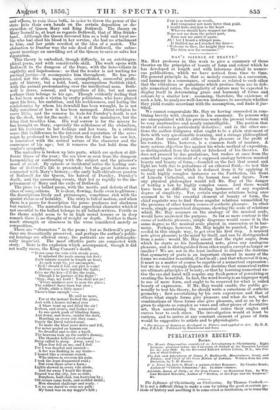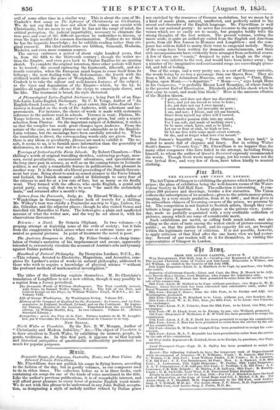The Infistenee of Christianity , on Civilisation. Br Thomas Cradock. —
It is not a difficult thing to make a case by taking.the good attertain Re-. Hods of history and ascribing it to some creed or institution, orto trace the •
evil of some other time in a similar way. This is about the sum of Mr. Cradocles first essay on The Influence of Christianity on Civilization. We do not say that he does not allow that crimes may coexist with
Christianity, but we mean to say that he has not the range of mind, the critical perception, the judicial impartiality, necessary to eliminate the true pros and cons of the difficult question he undertakes to discuss or even the logic needful for common discrimination. Neither do we think he has the requisite knowledge • for he exhibits reading rather than original research. His chief authorities are Gibbon, Sismondi, Mosheim, Michelet, and even more common sources.
The survey embraces a period of about eight hundred years, that is, from the fifth to the thirteenth century ; though the writer no tices the Empire, and even goes back to Paulus Emilius for an opening sketch. To complete the original intention, three other periods will have to be treated ; the second embracing the fourteenth, fifteenth, and six teenth centuries, when the European mind began to rouse itself from its lethargy ; the next dealing with the Reformation; the fourth with the civilized world since the peace of Westphalia, 1648. The plan of Mr. Oradock is to take the salient and well-known features of the subject ; as the vices and degradation of the Empire—which, by the by, he jumbles all together—the efforts of the clergy to emancipate slaves, and the like. The treatment is broad, the style rhetorical.
A Phraseological Latin-English Dictionary; being Part II. of an English-Latin Latin-English Dictionary. By C. D. Yonge, Author of "An English-Greek Lexicon," &c.—To a great extent, this Latin-English Dic tionary is founded on the work of Dr. Andrews' with selections and improvements. For instance, the choice of words is made with systematic
reference to the authors read in schools. Terence is read; Plautus, Mr.
Yonge believes, is not; all Terence's words are given, but only a scanty selection from Plautus. On the important subject of definition, it strikes
us that the compiler has made great changes upon .Andrews. From the
nature of the case, so many phrases are not admissible as in the EnglishLatin volume, but the meanings have been carefully attended to. When the translation is direct, the corresponding words only are given. When there is any idiom or peculiarity, phrases are used to exhibit it. The result, it seems to us, is to furnish more information than the generality of dictionaries, in a clearer way and in a less space.
Tracings of Iceland and the Farbe Islands. By Robert Chambers.—This shilling's worth of original travelling sketches embracing geology, man
ners social peculiarities, excursionists' adventures, and speculations on the man
ners, since past in science, as well as on the coming future in Icelandic
politics, is not only a remarkable feature in publications, but pleasant in another way. It is the result of a liberal proceeding of the Danish Government last year. Being about to send an armed steamer to the Faroe Islands and Iceland, the Danish steamer called at Edinburgh to carry four of the citizens to and fro at a low rate of fare, but as many as six finally went. They formed with the officers, who spoke English, a genial and jovial party, seeing all that was to be seen "far amid the melancholy main," and returned after a month's trip.
Letters from the Peninsula, Italy, 4.e. By Edward Wilkey, Author of "Wanderings in Germany."—Another book of travels for a shilling. Mr. Wilkey's tour was chiefly a Peninsular sea-trip to Vigo, Lisbon, Cadiz, Gibraltar, and the adjacent places ; though he also visited Genoa and travelled via Marseilles to Paris. The letters give a plain and unaffected account of what the writer saw, and the way he set about it, with his observations thereanent.
Frirwin : a Novel. By Octavia Oliphant. In two volumes.—A groping attempt at depicting some of the evils of society; but it fails from the exaggeration which arises when rare or extreme cases are presented as general pictures. In point of treatment the novel is poor: Tlw Austrian Dungeons in Italy. By Felice Orsini.—A cheap translation of Orsini's narrative of his imprisonment and escape, apparently intended to extensively circulate the account of Austria's arts and tyranny against Italian patriots.
Handbook of Natural Philosophy. By Dionysius Lardner, D.C.L., &c. —This volume, devoted to Electricity, Magnetism, and Acoustics, completes Dr. Lardner's series of works on natural philosophy, addressed to those who wish to acquire a knowledge of physical science "without the profound methods of mathematical investigation."

























 Previous page
Previous page